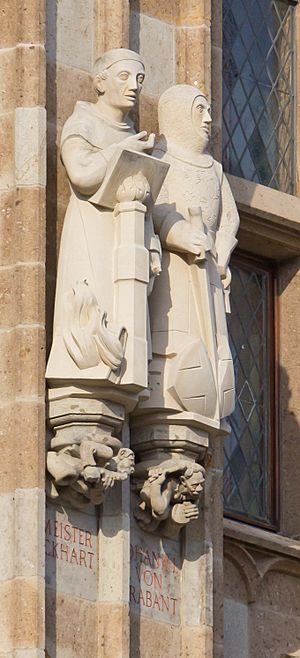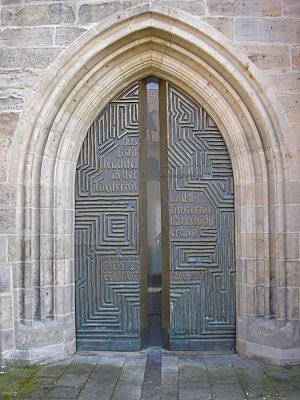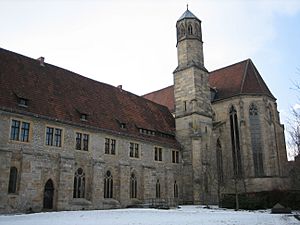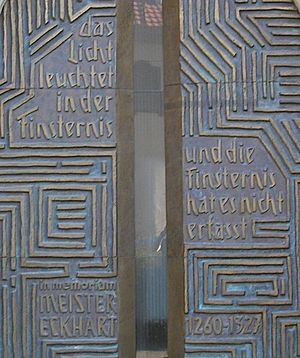Meister Eckhart facts for kids
Quick facts for kids
Eckhart von Hochheim
|
|
|---|---|

Sculpture of Meister Eckhart (left) and John I, Duke of Brabant (right) at Town Hall Tower, Cologne by Elisabeth Perger
|
|
| Born | c. 1260 |
| Died | c. 1328 (aged c. 68) |
| Era | Medieval philosophy |
| Region | Western philosophy |
| School |
|
|
Main interests
|
Religion, Spirtuality, Theology |
|
Influences
|
|
|
Influenced
|
|
Eckhart von Hochheim (around 1260 – around 1328), often called Meister Eckhart, was a German theologian and philosopher. He was also a mystic, meaning he explored deep spiritual experiences. He was born near Gotha in what is now central Germany.
Eckhart was a member of the Dominican Order, a group of Catholic priests. He became well-known during a time when there was tension between different religious groups. Later in his life, some of his teachings were questioned. He was accused of heresy, which means holding beliefs that go against official church teachings. He passed away before his case was fully decided.
He worked with religious groups like the Friends of God. His students, John Tauler and Henry Suso, continued his ideas. In recent times, people have become very interested in Meister Eckhart again. He is seen as a great mystic in modern spirituality and is studied by scholars.
Contents
Meister Eckhart's Life Story
Eckhart was likely born around 1260 in a village called Tambach, near Gotha. Not much is known about his family or early life. His real name was Eckhart, and his family name was von Hochheim.
Becoming a Church Leader
Around 1278, when he was about 18, Eckhart joined the Dominican convent in Erfurt. He probably studied in Cologne and perhaps at the University of Paris.
In 1294, Eckhart was a lecturer in Paris. Soon after, he became the head (Prior) of the Dominican convent in Erfurt. He also became the leader (Provincial) of the Dominicans in Thuringia. During this time, he wrote Reden der Unterweisung (The Talks of Instructions). These were talks he gave to new Dominican members.
In 1302, he returned to Paris to teach theology. He stayed there for about a year.
In 1303, Eckhart went back to Erfurt and became the Provincial for Saxony. This area was very large, stretching from the Netherlands to Livonia. He was in charge of 47 convents. He also helped set up three new convents for women.
In 1311, Eckhart was asked to teach in Paris again. This was a special honor, as only Thomas Aquinas had been invited back before. Eckhart taught in Paris for two more years.
After Paris, he spent time in Strasbourg. He mainly focused on guiding people spiritually and giving sermons in Dominican convents.
Accusations and Trial

Around 1323, Eckhart moved to Cologne. He continued to preach, speaking to many people during a time of change in the church. Some church leaders in Cologne became worried about his teachings.
In 1326, the archbishop of Cologne ordered a trial to investigate Eckhart's beliefs. Eckhart defended himself, explaining his teachings. He had the support of the local Dominican leaders.
On February 13, 1327, Eckhart gave a sermon in Cologne. He then publicly stated that he was innocent and would take back anything wrong found in his writings. He translated his statement into German so everyone could understand. When the verdict went against him, he appealed directly to the Pope.
Eckhart then traveled to Avignon, where the Pope lived at the time. Pope John XXII set up two groups to look into his case. On April 30, 1328, the Pope wrote that Eckhart's case was moving forward, but that Eckhart had already passed away. He likely died on January 28, 1328.
In 1329, the Pope issued a document about Eckhart's teachings. It said that some of his statements were against church beliefs, and others were suspicious. The document also mentioned that Eckhart had taken back anything he might have taught incorrectly before his death.
Efforts for Recognition
In recent years, the Dominican Order has tried to get Meister Eckhart fully recognized as a true Catholic theologian. Pope John Paul II spoke positively about Eckhart's writings. However, a full official recognition has not yet happened.
Eckhart's Ideas
Eckhart was trained in scholasticism, a way of thinking and teaching common in medieval universities. He knew a lot about the ideas of Aristotle and Augustine of Hippo. He was also greatly influenced by Neoplatonism, which is a philosophy based on the ideas of Plato. This influence can be seen in his ideas about God.
Sermons and Teachings
Eckhart is best known for his sermons, which he gave in German, the language of the common people. He tried to help people, monks, and nuns understand spiritual ideas. He often spoke about how God is present in each person's soul. He also talked about the importance of being detached from worldly things.
Eckhart said his sermons were meant to inspire people to do good. Sometimes, he used unusual language or seemed to go against common church teachings. This made him a target for questioning during his time.
Understanding God
Eckhart believed that God is very giving. He taught that God, out of great love, creates the world and everything in it. This idea is similar to the Neoplatonic idea of "overflowing," where the divine source cannot hold back its abundance.
Eckhart also made a difference between "God" and "Godhead." For him, the "Godhead" was the mysterious, ultimate source of everything, beyond what we can name or fully understand. "God" was the more active, creating aspect that we can relate to.
Eckhart's Impact and Study
Medieval Influence
Meister Eckhart was a very important thinker in the 13th century. His writings were widely read in the Middle Ages. Even after his death and the questioning of his ideas, some Dominicans and other religious groups continued to study his work.
Followers of Eckhart, like John Tauler and Henry Suso, continued to spread his ideas. They were part of a group called the Friends of God.
Later Discoveries
For a long time, Eckhart's writings were mostly forgotten, from the 1500s to the 1800s. Only a few of his sermons were known.
Interest in Eckhart grew again in the 1800s, especially among German philosophers. In 1857, Franz Pfeiffer published many of Eckhart's German sermons and writings, which sparked new interest. Later, Heinrich Seuse Denifle found and published Eckhart's Latin works.
Eckhart as a Mystic
There has been much discussion about whether Eckhart should be called a "mystic." Some scholars say he was a philosopher, deeply rooted in the university teachings of his time. Others see him as a profound spiritual guide.
Many agree that Eckhart was an original thinker. He translated complex philosophical ideas from Latin into German, making them available to more people. He explored deep spiritual concepts, like the idea that the divine essence is a mystery beyond all understanding.
Meister Eckhart's Modern Popularity
Influence on Modern Thinkers
Meister Eckhart's ideas have influenced many modern thinkers. For example, the American theologian Matthew Fox has written books about Eckhart's "Creation Spirituality."
The philosopher Martin Heidegger used Eckhart's ideas to develop his concept of Gelassenheit, which means "releasement" or "letting go."
Spirituality and Eastern Religions
Eckhart has become a hero in modern spirituality. Many people find his ideas connect with their own spiritual journeys. His famous quote, "The Eye with which I see God is the same Eye with which God sees me," is often used to show links between different spiritual traditions.
Some scholars have compared Eckhart's teachings to Eastern religions like Buddhism and Hinduism. For instance, D. T. Suzuki, a famous Zen Buddhist scholar, found similarities between Eckhart's idea of "pure nothingness" and the Buddhist concept of sunyata (emptiness). However, other scholars point out important differences, especially regarding the role of God in Eckhart's thought.
Psychology and Self-Growth
Eckhart's writings have also influenced psychology. The psychoanalyst Erich Fromm used many of Eckhart's ideas in his work. Carl Jung, another famous psychologist, also mentioned Eckhart in his discussions about the human self.
Meister Eckhart's ideas have inspired people like Dag Hammarskjöld, a former United Nations Secretary General. Hammarskjöld found that Eckhart's teachings helped him understand spiritual growth through selfless service to others.
Meister Eckhart Prize
There is even a special award called the Meister Eckhart Prize given to people who have made important contributions to philosophy.
Meister Eckhart's Writings
The complete collection of Eckhart's German and Latin works was finished in 2022. It took many years to gather and publish all his writings.
Latin Works
Eckhart had planned to write a huge work called Opus Tripartitum (Three-Part Work). However, only a small part of it still exists today. The main surviving Latin work is the Work of Commentaries, which includes a prologue, six commentaries, and 56 sermons.
Some of his other Latin works include:
- Parisian Questions (early writings from his time in Paris).
- Commentary on the Book of Genesis.
- Commentary on the Book of Exodus.
- Commentary on the Book of Wisdom.
- Commentary on John.
- Various sermons and a short text on the Lord's Prayer.
- His Defense from his trial.
German Works
It is harder to confirm if all the German texts attributed to Eckhart are truly his. This is because many of his sermons were written down by others from memory.
The critical edition of his works accepts 123 German sermons as genuine. Some of these sermons are known to be authentic because Eckhart himself mentioned them during his trial.
Only a few of his German treatises (longer writings) are considered truly authentic:
- Reden der Unterweisung (Counsels on Discernment): This is likely one of his earliest works, offering spiritual advice to young Dominicans.
- Liber Benedictus (Book "Benedictus"), which includes The Book of the Divine Consolation and a sermon called Of the Nobleman.
- Von Abgescheidenheit (On Detachment), though some scholars now think this one might not be by Eckhart.
Images for kids
See also
 In Spanish: Maestro Eckhart para niños
In Spanish: Maestro Eckhart para niños
- Book of the 24 Philosophers
- Brethren of the Free Spirit
- Essence–energies distinction
- Gonsalvo of Spain
- Sister Catherine Treatise
 | Victor J. Glover |
 | Yvonne Cagle |
 | Jeanette Epps |
 | Bernard A. Harris Jr. |




